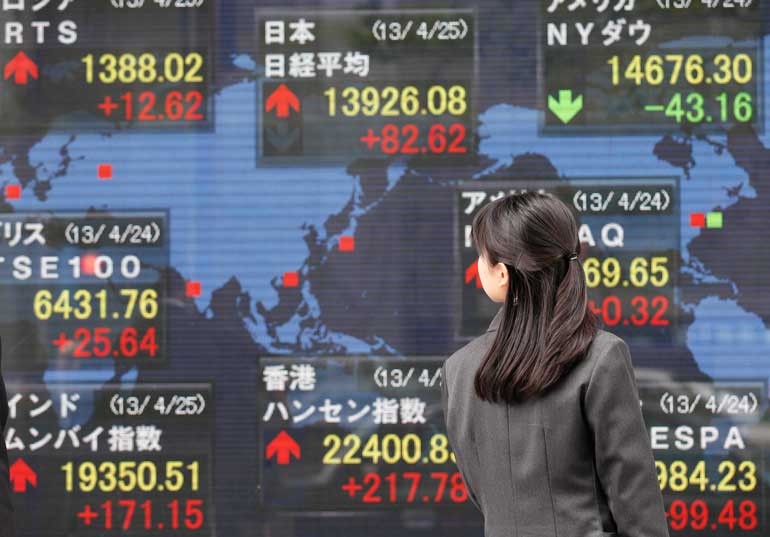Tuesday Feb 17, 2026
Tuesday Feb 17, 2026
Saturday, 6 August 2016 00:01 - - {{hitsCtrl.values.hits}}

Reuters: Asian shares followed global stock markets higher on Friday after the Bank of England launched a larger-than-expected post-Brexit stimulus package that sent the British pound tumbling.
An overnight rally in crude oil prices also sharpened risk appetites, but some caution before the July U.S. non-farm payrolls report later on Friday limited gains.
MSCI’s broadest index of Asia-Pacific shares outside Japan extended gains to 0.9%, headed for a 0.6% weekly gain. MSCI’s world stocks index rose 0.1% on Friday.
Japan’s Nikkei advanced 0.3%, on track for a loss of 1.6% for the week.
China’s CSI 300 index climbed 0.1%, set to end the week flat. The Shanghai Composite was little changed, poised for a 0.1% weekly gain.
The BoE’s quarter point rate cut to a record low 0.25% boosted shares in Europe while sending already low global bond yields even further down with British yields hitting record lows as gilt prices rose.
The BoE said it would take “whatever action is necessary” to achieve stability in the wake of Britain’s vote to leave the European Union.
“BoE Governor Mark Carney’s assessment of the post-Brexit U.K. economy was very negative, predicting the unemployment rate will rise from 4.9% to 5.5% over the next two years despite the new stimulus,” Angus Nicholson, market analyst at IG in Melbourne, wrote in a note.
“That makes it very likely that further cuts to the policy rate and expansions of the BoE’s other easing measures will be forthcoming over the coming months, providing further downside risks to the pound,” he said.
The British pound crawled up 0.2% to $1.3130 after retreating 1.7% overnight.
The U.S. Treasury 10-year note yield was little changed at 1.4991% after dropping 25 basis points overnight during a broad post-BoE rally in bond markets, which took the 10-year gilt yield to a record low of 0.639%.
Yields on euro zone bonds such as German bunds also tumbled on Thursday as bond prices rose after the BoE news.
Wall Street ended Thursday little changed ahead of the July U.S. nonfarm payrolls report later on Friday which will be scoured for clues to whether it is strong enough to support a Federal Reserve rate hike as early as September.
Economists polled by Reuters expect U.S. employers to have added 180,000 jobs, compared with 287,000 in June.
“Based on our analysis, the payroll growth in July is likely to be pretty strong,” said Ayako Sera, market strategist at Sumitomo Mitsui Trust Bank. “I expect a figure above 200,000. That should be positive for the dollar.”
The dollar gained 0.1% to 101.27 yen, on track to fall 0.8% on the week. The euro was steady at $1.1131 EUR=, set to end the week 0.4% lower.
The dollar index was steady at 95.775 after gaining 0.2% on Thursday.
Gold was also flat at $1,360.30 an ounce ahead of the payrolls report, heading for a 0.7% gain for the week.
Oil pulled back slightly after rallying overnight following a modest stockpile drop at the U.S. delivery hub for crude futures. It is still well above the 3-1/2-month lows hit earlier this week, as traders covered short positions.
U.S. crude was down 0.4% at $41.75 a barrel after surging 2.7% overnight. It’s on track for a 0.4% gain for the week.
Global benchmark Brent crude futures slipped 0.5% to $44.07, heading for a weekly rise of 3.8%.
The Australian dollar hovered near a 3-week high, after the Reserve Bank of Australia said core inflation is likely to remain below target until 2018, leaving the door open to more policy easing following the cut in its benchmark rate to an all-time low of 1.5% this week.
The futures market is pricing in a 50-50 chance of another cut by year end.
The Aussie climbed 0.25% to $0.7649, and Australian shares added 0.5%.